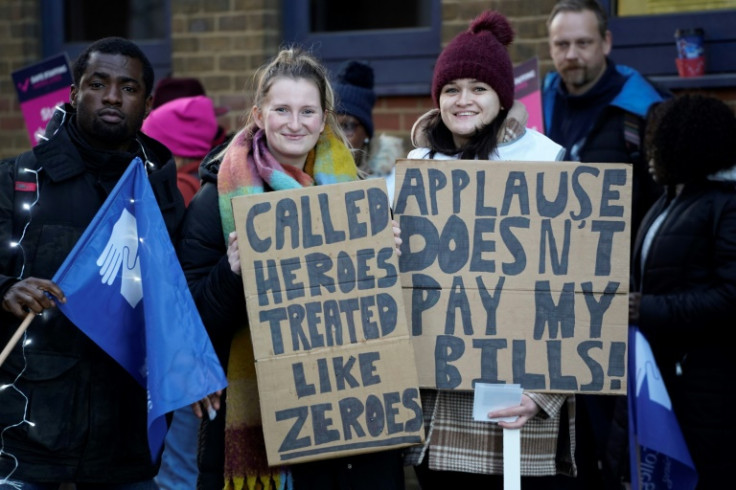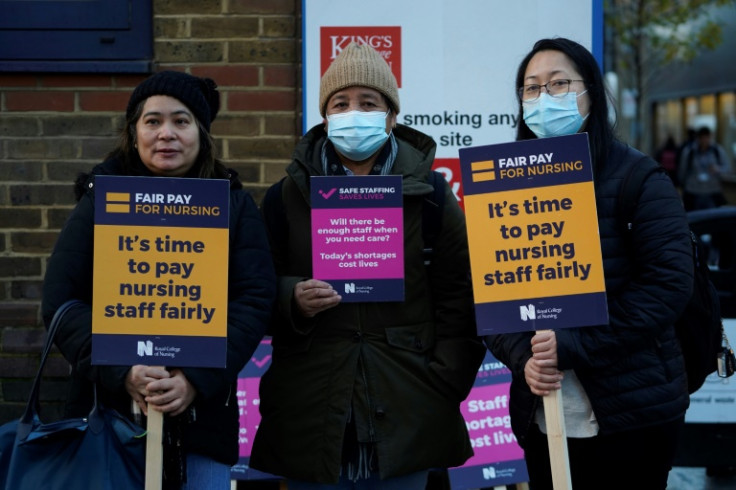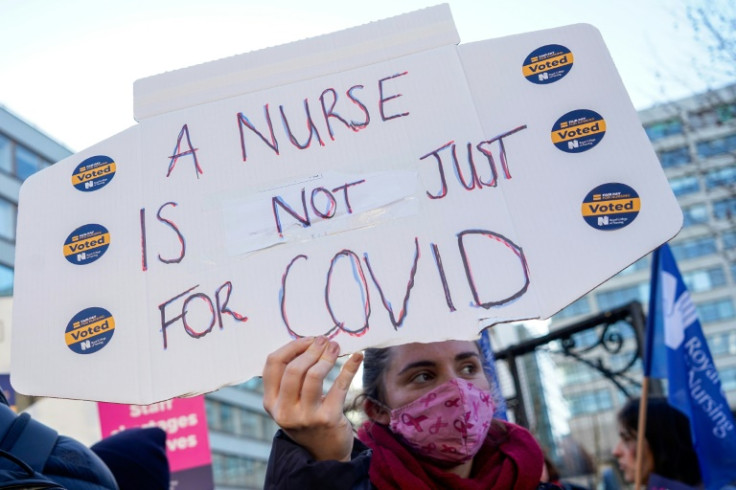Ambulance workers walk out in strike-hit UK
Health Secretary Steve Barclay, writing in the Daily Telegraph newspaper, accused the unions of making a "conscious decision" to "inflict harm" on patients.

Striking ambulance workers in England and Wales manned picket lines on Wednesday, escalating a pay dispute between the government and a host of public-sector staff.
A series of stoppages are causing misery across Britain in the run-up to Christmas, with railway workers and passport control officers set to hinder festive holiday getaways as the government resists the growing pay demands.
Employees across the UK economy are demanding salary rises to match or beat decades-high inflation -- currently running at nearly 11 percent -- which is spurring the worst cost-of-living crisis in a generation.
"We're not paid enough for what we deserve," 24-year-old paramedic Kirsten Reid told AFP in Crawley, southern England. "Secondly, patient safety is a huge thing... our response times are shocking, and they need to be better."
"We do 12-hour shifts with a 30-minute break, but they're rarely ever 12-hour shifts. We're usually overrun," she added.

The government and unions continue to trade blame over the strikes amid fears of possible loss of life, as healthcare leaders warned about straining a system already in crisis.
On Tuesday, thousands of members of the Royal College of Nursing (RCN) in England, Wales and Northern Ireland took to picket lines, five days after their first strike in its 106-year history.
Health Secretary Steve Barclay, writing in the Daily Telegraph newspaper, accused the unions of making a "conscious decision" to "inflict harm" on patients.
GMB union national secretary, Rachel Harrison, hit back calling his comments "insulting".
"Ambulance workers are seething at such a crude, insulting attempt to divert attention from the government's continued chaos in the NHS," she said.
Around a dozen staff formed the picket line outside the ambulance base in Crawley.
"My members are striking today for fair pay. At the end of the day, they've had a 20 percent pay cut over the last 10 years, and they can no longer afford to keep going with that," GMB union representative Lib Whitfield told AFP.

Outside the West Midlands Ambulance Services' hub in Longford in central England, striking staff stood behind a banner reading "our NHS is under siege".
As passing ambulances sounded their horns in support, union representative Steve Thompson called on the government to "wake up and realise that this situation is serious".
Unions representing both nurses and ambulance workers have threatened further stoppages in the new year if the government keeps refusing to discuss pay.
Nurses in Scotland -- who did not join the two recent walkouts elsewhere -- will announce strike dates early next year after overwhelmingly rejecting the latest pay offer from the Scottish government, the RCN said Wednesday.
The government insists it must stick to modest increases for public sector workers recommended by pay review bodies it says are independent.
"The best way to help them and help everyone else in the country is for us to get a grip and reduce inflation as quickly as possible," Prime Minister Rishi Sunak has said of the workers demanding raises.
Ministers have drafted in 750 military personnel to drive ambulances and perform logistics roles to mitigate the impact of Wednesday's ambulance strike which will affect almost all areas of England and Wales.
Despite the government's insistence that it will not negotiate, polls indicate most people support nurses, and to a lesser extent other workers walking out.
YouGov polling published Tuesday showed two-thirds of Britons support striking nurses, with 63-percent support for ambulance staff.
"I don't understand why the government doesn't (pay) more attention."
Accountant Tanaka Chidawanyika echoed the sentiment.
"The government won't speak to them so what other option have they?
"The ambulance services and health sector have always done the best, through the pandemic and everything, and I think now's the time that they should get what they deserve."
© Copyright AFP 2026. All rights reserved.




















